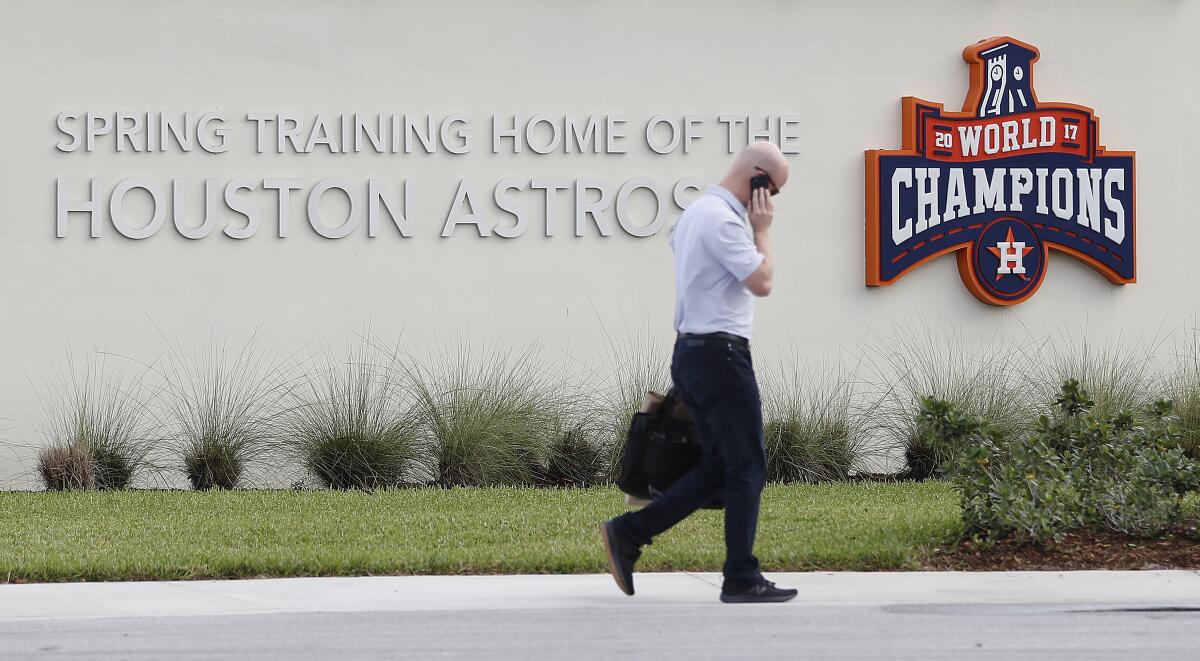Op-Ed: How baseball’s bungled investigation gave the Astros amnesty for cheating

- Share via
As President Trump freely wields his joystick of pardons and undue pressure on prosecutors, the sports world faces its own crisis of attenuated punishment.
In the Houston Astros’ sign-stealing scandal, Rob Manfred, commissioner of Major League Baseball, has talked like a prosecutor investigating wrongdoing and willing to impose punishment on the perpetrators. So the public, the fans, the teams damaged by the cheating can hardly be faulted for being mystified and outraged by the total lack of punishment for the players who cheated.
Manfred’s handling of this scandal is disappointing, but it’s not at all surprising that the MLB investigation would end up like this.
The investigation didn’t result in punishment or real accountability because Manfred’s role is not as a real prosecutor seeking justice or deterrence. His duty is to protect the owners who employ him and make money from their considerable investments in a major league baseball team. Penalties and profits don’t always mix, and this would appear to be a classic example. Reputation, viewership and ticket sales are in jeopardy when the integrity of the game comes into question.
Los Angeles Times editorial board endorsements for the U.S. House, California ballot measures and more.
With spring training presumably redirecting the attention of players and fans, what would be a better way for the representative of baseball’s owners to handle serious cheating than to sweep it under the rug as quickly as possible? No union appeals, minimal disillusionment of the Houston fan base, and a modest fine that would pacify angry players and fans. No muss, no fuss, minimal financial fallout.
The charade of an investigation purporting to serve justice began with the commissioner’s grant of across-the-board immunity to all the Houston players involved in season-long cheating. Manfred is right that perpetrators generally won’t describe their involvement or how a scheme operated without a grant of immunity. But in real investigations, immunity is sparingly granted, with it given first to a little fish or two who can implicate bigger fish. Mass immunity goes by a different name: amnesty.
Manfred has sought to justify his across-the-board immunity to the Houston players as the only way he could learn the details of the sign stealing. As an investigative tactic, it makes no sense. He essentially learned the same thing over and over from all the teammates. In exchange, everyone was let off the hook with not even a slap on the wrist. It’s hard to think of a more effective way to encourage cheating.
Manfred’s second error was to blame the players union for across-the-board immunity. According to the commissioner, his hands were tied. Which, of course, couldn’t be farther from the truth. The players union functions in this case much like a defense attorney, who is bound to seek the most favorable outcome for a client. When defense counsel represents that he or she will appeal any punishment imposed on a client, a prosecutor does not, quaking in his or her boots, quickly abort the case via a grant of immunity.
Manfred’s final error is to insist that the Astros’ 2017 World Series Championship, secured with the aid of knowing which pitch would be coming next, cannot be rescinded. He claims there’s no precedent for this action, but he’s wrong. There is plenty of precedent for revoking titles in sports competitions. It has been done in sports of every sort, from basketball to cycling, tennis to lacrosse, track and field to volleyball.
Indeed, almost a century before the Astros’ sign-stealing debacle, the Chicago Black Sox threw the World Series. Baseball responded to that scandal by appointing its first commissioner, the high-minded Judge Kenesaw Mountain Landis, who banned the guilty parties for life and helped restore the integrity of the game.
Manfred and MLB had hoped to wrap up this scandal and move on. Only it hasn’t turned out that way. The public and the 29 other major league teams aren’t pacified and the damage to baseball will last for a long, long time.
Judge Landis, where are you?
Jay Sterling Silver is a law professor at St. Thomas University School of Law.
More to Read
A cure for the common opinion
Get thought-provoking perspectives with our weekly newsletter.
You may occasionally receive promotional content from the Los Angeles Times.











